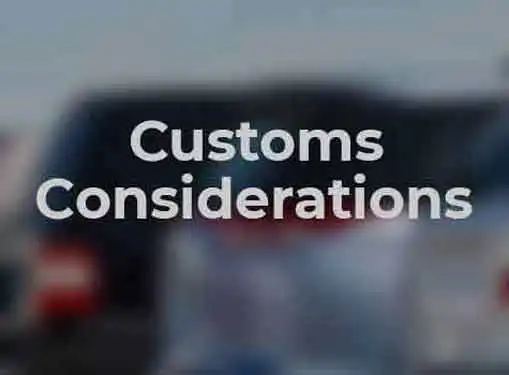How to Export
Customs Considerations
Written by Stefan Martinovic for Gaebler Ventures
Before you say bon voyage to the goods you are exporting or import goods from another country, be sure you understand how international customs will affect the shipment.
In today's global economy, even small businesses are getting involved in selling and shipping products internationally.

Overseas selling provides small business owners a wealth of new opportunities, but delivering products to consumers overseas can provide additional challenges to overcome.
In addition to the added costs of long-distance international shipping, considerations such as foreign customs clearinghouses must be taken into account when deciding to send your product around the world as opposed to around the corner.
You will find in your international shipping endeavors that when you ship a package overseas, you are required to fill out a customs declaration stating the contents and declared value of the package contents.
Customs clearinghouses are set up in every country to monitor the flow of all goods entering the country from a foreign nation. This allows government officials to keep track of potentially hazardous materials coming across the border as well as to monitor the flow of international trade. Additionally, this allows for international officials in the destination country to properly gauge the taxes to be assessed to the receiving party.
When shipping to North American countries, due to NAFTA legislation, the receiving party may be eligible for customs duty reimbursement. However, in all other foreign trade transactions, the buyer of goods purchased outside his or her own country is required to pay customs duties on incoming products.
Depending on the destination country and the value of items received, these taxes can be quite a significant amount. At times, shippers may be tempted to underestimate the value of a package's contents for the benefit of their customer, but this is an illegal practice and is not encouraged.
Aside from the special taxes administered by the customs clearinghouse, the package may be held at the facility for inspection and will add to the time in transit. Depending on the declared value of the shipment in question, customs inspectors may elect for a full examination in order to ascertain the true value for taxation purposes. In many cases, this is done to verify that contraband is not entering the country illegally and to provide the greatest amount of compensation possible to the applicable government's department of taxation and revenue.
Customs declaration can be tedious and time consuming, and foreign customers must be made aware that there will most likely be added time in transit for this type of transaction and that they will be responsible for the payment of all duties and related fees.
As long as buyer and seller both understand the customs and taxation implications, international transactions can certainly prove to be mutually beneficial.
Stefan Martinovic has an extensive body of work across the financial services, manufacturing, and retail industries. He is currently pursuing an MBA in Management and Entrepreneurship at The College of William & Mary.
Share this article
Additional Resources for Entrepreneurs



Conversation Board
We greatly appreciate any advice you can provide on this topic. Please contribute your insights on this topic so others can benefit.